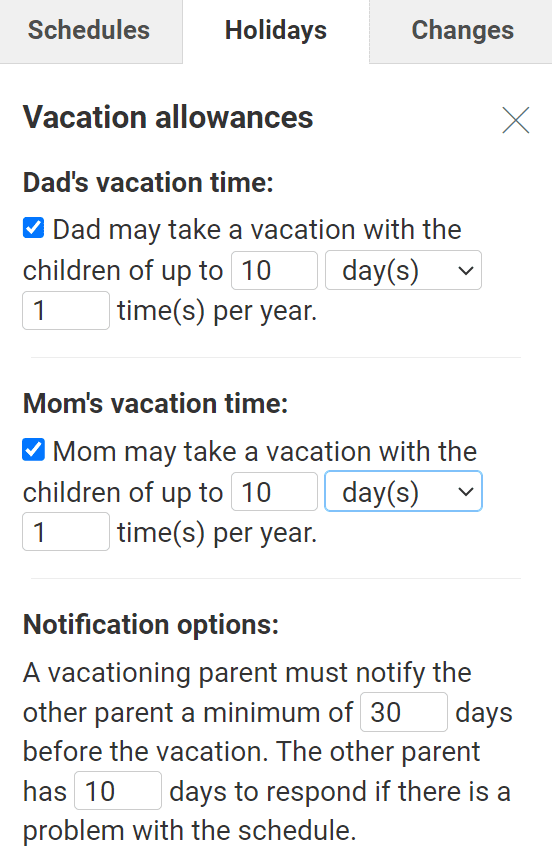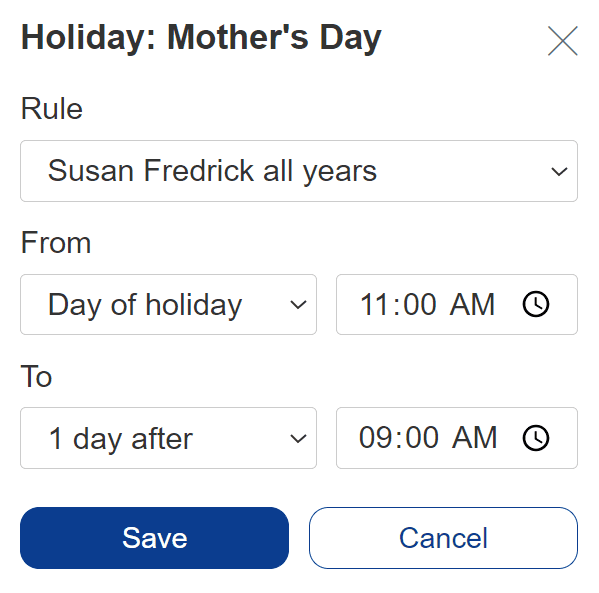Utah Parent-Time Schedules (Custody and Visitation)
In a case regarding custody of your child, a Utah court requires you to propose a parenting plan and a parent-time schedule. Once a court orders a schedule, you have to follow it. Staying consistent helps your child adjust.
When and how to submit your parent-time schedule
File your proposed parenting plan and parent-time schedule early in your divorce or custody case. Submit them with your petition (if you're the petitioner) or with your answer or counterclaim (if you're the respondent).
If you and your co-parent will make major parenting decisions together (i.e., joint legal custody) or if your child will spend at least 111 overnights per year in each of your households (i.e., joint physical custody), your plan and schedule will tend to be detailed. This helps you both know what to expect and to work better together.
If you're seeking sole legal and physical custody, your proposed parenting plan and schedule may be simple. Nonetheless, it's important that you submit something to meet the court requirement. Doing so preserves your right to argue in court. If you don't submit anything, and if the other parent submits their own proposal that meets court requirements, they could ask the court to simply approve their request. This is called a default judgment.
Ideally, you and your co-parent will cooperate and submit your proposal together. When parents agree, the court is likely to approve their agreement.
However, sometimes parents can't agree on a schedule. When that happens, Utah courts award one of a few standard schedules. If the noncustodial parent hasn't been actively parenting, they'll receive a minimum schedule; if they've been an active parent to a child who's at least 5 years old, they might receive an increased schedule or even equal time.
You can also — separately or together — propose a backup plan and schedule. This enables you to quickly pivot to your second-favorite proposal if the court doesn't approve your first request. A backup proposal is formally known as a pleading in the alternative.
Utah's minimum parent-time schedule
The minimum visits vary based on the child's age. Utah refers to an exchange of your child as a transfer.
The schedules for babies under 18 months give the noncustodial parent little time, but the noncustodial parent is likely to get more time as the child grows. So, although a simple parenting plan and parent-time schedule may seem as though it's enough for your baby's needs, consider that you'll appreciate having more details as you both develop your co-parenting relationship.
Be proactive. Writing a detailed parenting plan and schedule shows the court you take your parent-time seriously and may help you increase your time in the future. Thinking ahead can also help you avoid returning to court to update your parent-time schedule.
Baby's first year
For a newborn, the noncustodial parent has three two-hour visits every week.
 Try this with Custody X Change.
Try this with Custody X Change.
When the baby is five months, those weekly visits lengthen to three hours each.

When the baby is nine months, they get an eight-hour visit and a three-hour visit each week.

12–18 months
The noncustodial parent has a long visit every weekend. On one weekend, it's an eight-hour daytime visit, and on the next, it's an overnight visit from Friday 6 p.m. to Saturday noon. There's also a three-hour midweek visit every week.
(To do this in Custody X Change, add a schedule using a template, select "custom repeating rate", and set it to repeat every two weeks.)

18 months and up: Regular schedule
The noncustodial parent has alternating weekends from Friday 6 p.m. to Sunday 7 p.m. They also get a midweek evening visit, 5:30–8:30 p.m. The parents have a roughly 80/20 timesplit.

The start times can be adjusted to fit the child's school dismissal.
(They can also be adjusted to fit a daycare schedule, as long as both parents agree to it. If parents bring a disagreement to court regarding a very young child, the court is likely to be strict about the start times, as daycare isn't legally considered to be "school.")
When there is no school, visits can begin at 9 a.m., allowing the noncustodial parent to spend the whole day with their child.

This minimum schedule reaches the threshold at which the law requires you to submit a full parenting plan.
18 months and up: Vacation schedule
Parents can take their child for occasional vacations.
According to the child's age:
- 18 months–3 years: A one-week vacation for each parent. Parents can also try a 50/50 schedule for a one-week period.
- 3–5 years: A two-week vacation for the noncustodial parent, and a one-week vacation for the custodial parent. Parents can also try a 50/50 schedule for a two-week period.
- 5–18 years: Every summer, a two-week vacation for each parent, and the noncustodial parent can have another two-week period during which they allow the custodial parent a weekly visit.
Vacations don't necessarily mean the parents have to travel, but they do require advance notice to the other parent.

When a court might order more time
For a child age 5–18, a court may give the noncustodial parent more time if:
- Both parents have been involved in the child's life (e.g., by helping with meals, bath time, bedtime and homework or by having emotional bonds).
- Both parents can handle the arrangement (e.g., because your homes are adequate for your child's needs, you live close by each other and close to your child's school, and your work schedule allows it).
- The parent-time serves your child's best interests.
Increased parent-time schedule
Increased time is defined as 145 overnights per year for the noncustodial parent.
The noncustodial parent has alternating weekends from Friday afternoon to Monday morning. Normally this visit begins when the child's school ends for the week, but it could begin as early as 9 a.m. on Friday if there's no school that day. This weekend visit ends on Monday morning, usually when the child returns to school — or, if there's no school on Monday, the visit ends at 8 a.m.
They also get a midweek overnight. It can start at school dismissal and end when school begins the next morning. If there is no school, it could be a 24-hour visit, 8 a.m.–8 a.m.

This is closer to a 70/30 split.
Equal parent-time schedule
Equal time (a 50/50 split) is defined as 182 overnights per year for one parent and 183 for the other.
Be aware that having the extra overnight won't give you an advantage in child support, nor will it guarantee that your home address will be used for your child's school enrollment or that you'll have the right to make educational decisions.
If the court says you must have equal time, and if you and your co-parent know which regular and holiday schedule you'd like to have, propose it to the court for approval.
For example, you both might agree to alternating weeks.

If you don't reach agreement, the court will order a 2-2-5-5 schedule. One of you will begin your parent-time every Monday morning (when school begins, or 9 a.m. when there's no school), the other every Wednesday morning, and you'll alternate who has the child for the weekend. That means that one week has only a Wednesday transfer, and the next week has a Monday and Friday transfer too.

Holidays
It's typical for a mother to get Mother's Day and a father to get Father's Day. Both parents get time on or near the child's birthday.
If you use Custody X Change to make your schedule, it's easy to put in the holidays.

Other holidays in Utah's standard schedule include MLK Day, Presidents Day, Memorial Day, Juneteenth, Independence Day, Pioneer Day, Labor Day, Columbus Day, Halloween, Veterans Day and Thanksgiving.
The parents rotate who gets which holiday — for example, in the first year, the custodial parent gets MLK Day, the noncustodial parent gets Presidents Day, and so on. The next year, they get those holidays in the opposite order.
The amount of time the noncustodial parent gets depends on the child's age. For example, for a newborn, the noncustodial parent gets two-hour visits on holidays. When the baby is nine months, those visits increase to eight hours each, and so on.
Additionally, in any given year, one parent gets Spring Break, the other gets Fall Break, and they switch the following year. Winter Break is split in half so that parents alternate who gets Christmas from year to year.
The easiest way to make a schedule
If you're like most parents, creating a parent-time schedule will feel daunting. How do you make a document that's legally valid and doesn't leave any loose ends?
The Custody X Change app makes it easy. Either customize a schedule template, or click and drag in your custody calendar to make a schedule from scratch.
Try this with Custody X Change.
Then watch a full description appear in your parenting plan.
Try this with Custody X Change.
You and your co-parent can keep using the app to be notified of upcoming transfers and to share your minor scheduling adjustments.
The combination of a visual and written schedule easily communicates who has the child when. Take advantage of Custody X Change to make your schedule as clear and thorough as can be.
